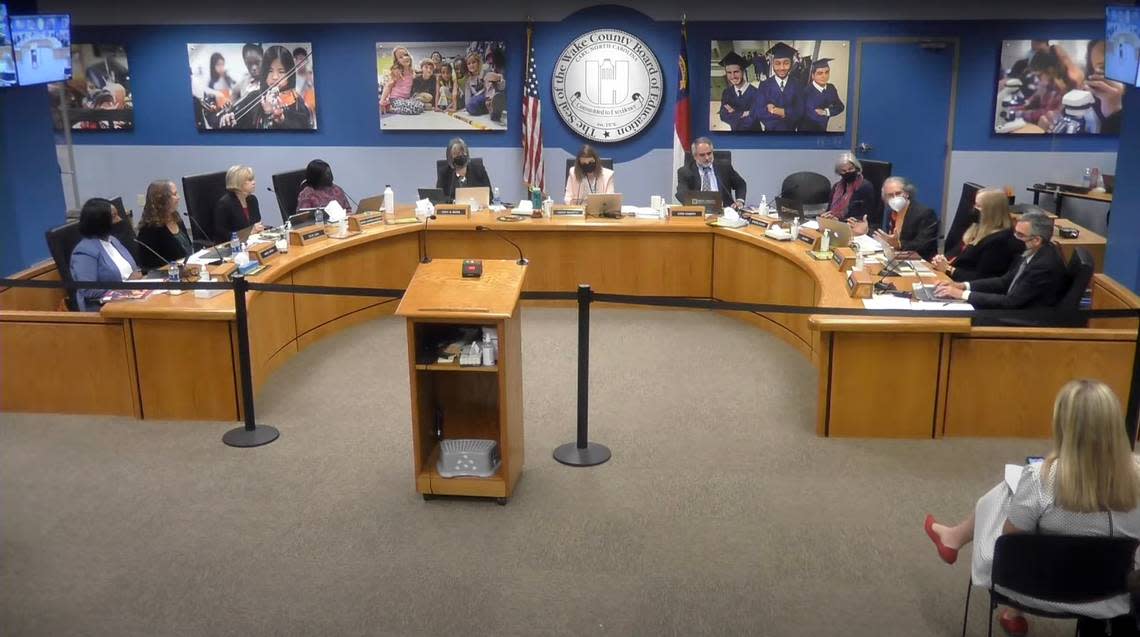Wake school board committee backs new equity policy. A vote may come before election.
A Wake County school board committee on Tuesday unanimously backed a proposed equity policy that calls for addressing disparities, reflecting on biases and recognizing the voices of marginalized groups.
The draft policy calls on North Carolina’s largest school district to take steps such as having diverse instructional materials, recruiting a more diverse workforce and questioning practices that lead to inequity.
The policy will now go to the full board for a vote potentially on Nov. 1 — a week before elections featuring school board candidates who back having an equity policy and others who say the policy is a waste of time.
“As a senior, I’m on my way out,” Aaron Ng, a member of the student equity team at Sanderson High School in Raleigh, told the school board’s policy committee on Tuesday. “But when I imagine a future with this policy as the framework, I can only dream of the grand feats the next generations will achieve. And not just one demographic or another, no, everyone.”
But conservative critics are accusing the district of promoting a “socialist” policy. Even without an equity policy, Wake spends more than $1 million a year on an Office of Equity Affairs.
“We’re wasting money on a diversity, equity and inclusion office while we are failing Black students ‘in the name of diversity,’” John Amanchukwu, a local Black pastor, said in a speech in last week’s school board meeting that has gone viral.
Defining equity
The proposed policy defines equity as “the elimination of predictability and disproportionality of outcomes based on student characteristics.”
Examples of student characteristics are race, ethnicity, socioeconomic status, language of origin, disability, sex, gender identity and sexual orientation.

The policy says Wake will take steps such as:
▪ Identifying and providing high-quality instructional materials and methods that “represent the rich diversity of our nation, respect the legitimacy of different cultures, and empower students to value diverse perspectives.”
▪ Recruiting and retaining racially and linguistically diverse and culturally competent administrative, instructional and support personnel.
▪ Eliminating practices that lead to the over- or under-representation of any student group compared to peers in areas such as special education, student discipline, academically or intellectually gifted programs, advanced coursework and Advanced Placement courses.
Board member Jim Martin said it’s wrong for critics to say that equity is a “zero sum” that won’t help everybody. He said it’s also wrong to say that equity is about “dilution” of quality.
“Equity and excellence go together,” Martin said. “Equity is about excellence.”
Support for equity policy
Before Tuesday’s committee vote, board members heard from principals, teachers, parents and students who said an equity policy is needed.
Teresa Caswell, co-chair of the Wake County Division of Principals and Assistant Principals’ Equity Committee, said having an equity policy will encourage more diverse applicants to work in Wake.
“We know that students experience more success in school when they have at least one teacher who reflects their racial identity,” said Caswell, principal of Parkside Elementary School in Morrisville. “The success grows exponentially when they have multiple K-12 teachers who look like them.”
Teresa Jones, president of the Wake County PTA Council, said having an equity policy will help address the issue of PTA fundraising inequity. Jones said many PTAs have turned to fundraising models that leave out the most vulnerable students.
“I believe many PTAs have lost their way and have primarily become fundraising organizations, further increasing the disparity among schools in our district,” Jones said.
Beliefs and biases
The vote came after lengthy debate about the policy’s wording.
Much of the debate was over how the policy previously called for school employees to “examine and reflect on individual beliefs and biases that negatively impact student outcomes.” The updated version initially presented on Tuesday replaced the words “beliefs and biases” with the word “practice.”
Will Chavis, assistant superintendent for equity affairs, said the word “beliefs” was dropped because people were concerned it might be referring to religious beliefs.
School board member Heather Scott argued that they need to have employees reflect on the impact of their implicit biases, such as anti-LGBTQ thoughts and racist thoughts, on students.
“Does my belief as a white, cisgender Catholic woman potentially have a negative impact on a student?” said Scott, a former music teacher. “I think that’s something I need to constantly examine and question to be the best educator or be the best board member or best community member I can be.”
But board vice chairman Chris Heagarty said removing the language about beliefs was essential to having a workable policy. He said the board would get into a “slippery slope” by talking about beliefs.
“You cannot dictate belief,” Heagarty said. “We can honestly and openly evaluate practice. We can see practice. We can look at practice objectively.”
In a compromise, the policy committee supported Martin’s suggestion to restore the word “biases” to the sentence to go along with practice. Chavis asked for the board to vote on the policy on Nov. 1.
